Another bright and sunny day, although not quite as warm as yesterday: 16C / 60F is still very warm for late March. This evening, we are experiencing serious problems with dense smoke as a result of muirburn, the practice of burning stretches of moorland in order for the heather to regenerate. Visibility is down to less than a quarter mile and it smells strongly of smoke. It has been going on since last week, but I am reading reports of a large fire in the South Lochs area of Lewis, 12 miles south of here. Residents of the villages of Leurbost and Crossbost, 6 miles south of Stornoway, are complaining even more than the folk here in SY. It says in the Muirburn Code, that it should not become a nuisance to surrouding communities, well, if this isn't a nuisance, I don't know what is.
The captain of the cargo ship Flinterspirit, which disputed passage with the island of North Uist last week, appeared in court today, charged with offences in relation to the incident. He was also found to be three and a half times over the legal blood alcohol limit whilst in charge of a ship in Stornoway harbour.
Blogger is switching us all over to the new format as of 1 April (no joke), so I have grudgingly changed over now. I know for a fact I shall complain bitterly; I tried it in beta, and had to abandon it due to copy & paste problems. Tomorrow morning, I anticipate that the air will be turning blue around my laptop when I do my next tropical cyclone update.
View across the Outer Harbour of Stornoway
Tuesday, 27 March 2012
Monday, 26 March 2012
Out of the blue
On 29 December 2007, I received an email from someone I had never heard of before. She had been reading my blog, Northern Trip at the time, and wanted to become friends by email. So, Frances and I did just that. We swapped emails on a regular basis for the following few months, until I received the devastating news of the death of my mother. This prompted my temporary withdrawal from J-land, blogging and emailing. However, as time went on, matters returned more or less to normal and I also resumed contact with Frances. She often spoke of her granddaughter in the Navy. Latterly, we took up contact by Facebook, until October last year.
Frances had been diagnosed with cancer, and cruelly, her Facebook account was cloned at the same time. Her condition deteriorated rapidly since Halloween, as reported by her granddaughter. This evening, the message was posted that Frances, now in hospice, is not expected to make it through the night - it's 5pm where she is.
If Frances should pass away in the next few hours, or whatever time it will take, I will be deeply saddened for her family. For my part, I will miss our email correspondence, the friendship from afar.
A bright star from the Lone Star State will have set.
Frances had been diagnosed with cancer, and cruelly, her Facebook account was cloned at the same time. Her condition deteriorated rapidly since Halloween, as reported by her granddaughter. This evening, the message was posted that Frances, now in hospice, is not expected to make it through the night - it's 5pm where she is.
If Frances should pass away in the next few hours, or whatever time it will take, I will be deeply saddened for her family. For my part, I will miss our email correspondence, the friendship from afar.
A bright star from the Lone Star State will have set.
Monday 26 March
Another sunny and warm day, with the mercury in Stornoway reaching a summery 17C / 63F. Apparently, this warm air is being blown straight from North Africa. Unfortunately, our spell of early summer looks set to come to an end on Wednesday. Better make the most of it while it lasts.
Which I did today, by going on a road trip to Ness, in the far north of Lewis, during the afternoon. The object was to visit an old cemetery, and have a look round the small harbour of Port of Ness. I shall let the pictures do the talking.

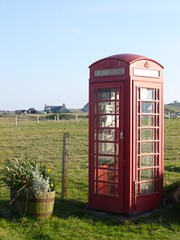
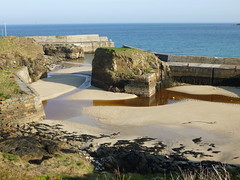
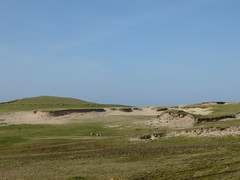


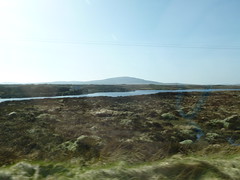
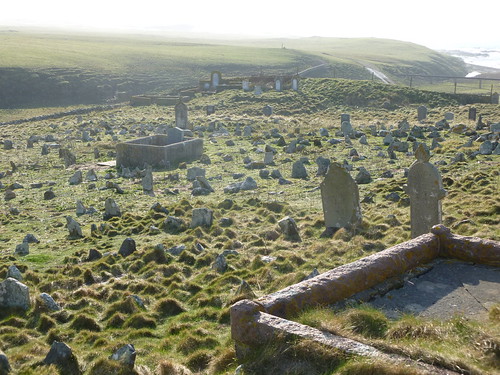
I should add that each rock represents a grave.
Which I did today, by going on a road trip to Ness, in the far north of Lewis, during the afternoon. The object was to visit an old cemetery, and have a look round the small harbour of Port of Ness. I shall let the pictures do the talking.








I should add that each rock represents a grave.
Sunday, 25 March 2012
Sunday 25 March
A beautiful sunny day, with a nice breeze going. It remains hazy, with the mercury up to 15C / 59F. Fyvie in Aberdeenshire reached 23C / 73F. The clock went forward last night, and we now have sunset at 8pm. The days will open out further, with sunset at 10.35pm by the summer solstice.
Went for a nice walk around the Castle Grounds this afternoon, where I had not been since last September at the very least. I'll leave some pictures for you all to enjoy.
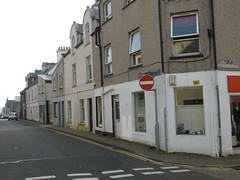
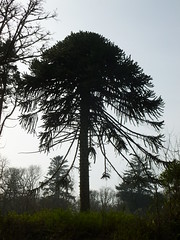
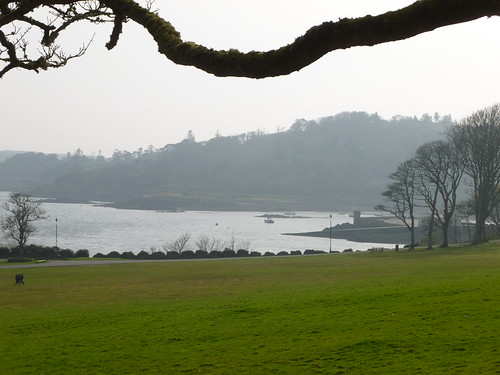
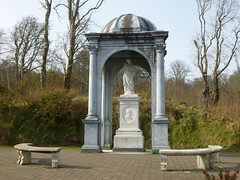
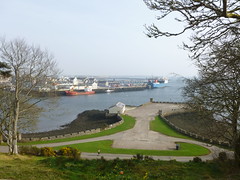
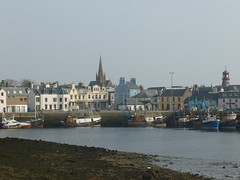
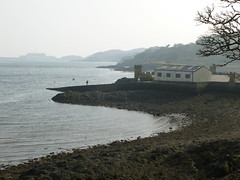
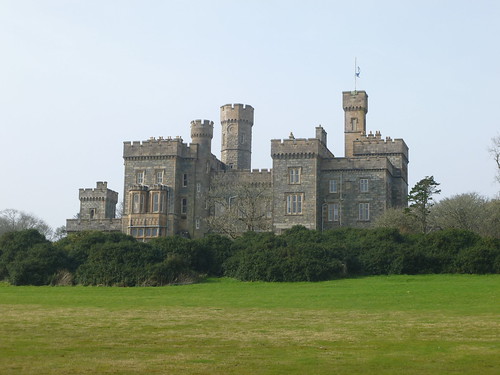
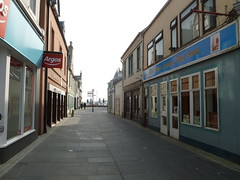
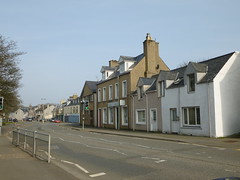
Went for a nice walk around the Castle Grounds this afternoon, where I had not been since last September at the very least. I'll leave some pictures for you all to enjoy.










Saturday, 24 March 2012
Saturday 24 March
A beautiful if very hazy spring day, with the daisies out and the mercury right up at 14C / 57F. No wind and feeling pleasantly warm in the sun. Today was a big day in Stornoway, with a march and rally snaking through the town at lunchtime. This was in protest at the abolition of RET ferry fares for commercial vehicles (see yesterday's entry), which could see a multiplication of transportation costs and therefore costs of living for everybody. Our parliamentary representatives were conspicuous for their absence; the MSP is a government minister in Edinburgh, which may have compromised his ability to speak up for his constituents. To be honest, if he can't do that, he should quit his position in government. IMHO. I'll close this post with some pics from the event.
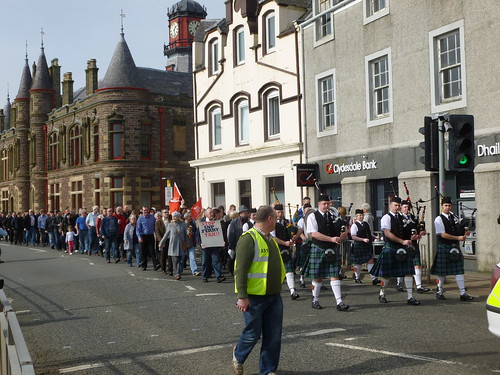
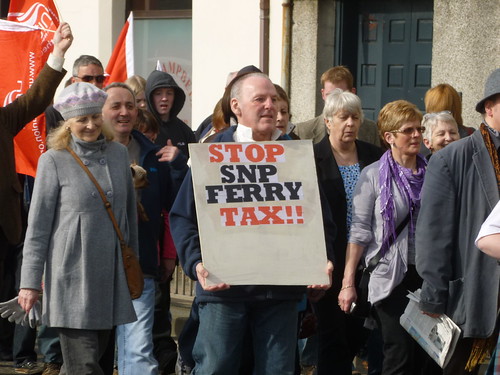




Friday, 23 March 2012
Friday 23 March
A beautiful sunny day, with no wind and no clouds. We managed 13C / 55F, which is very good for late March. The settled weather looks set to continue in the days ahead, with southeasterly winds bringing more mild air to the far northwest.
Tomorrow, there will be a march and rally through Stornoway to protest against the end of reduced ferry fares for commercial vehicles as of next month. In October 2008, the Scottish Government introduced reduced ferry fares to boost the local economy. The Road Equivalent Tarriff for commercial vehicles is being discontinued, meaning a steep price rise for their ferry crossings. Everything in these islands has to come in by ferry, and supplies all come in on board commercial trucks. The increased costs are passed on to customers and consumers (not necessarily the same people), and emotions are running high on the subject.
For those in Stornoway, the march starts at 1pm from the car park for the Nicolson Institute on Smith Avenue, with vehicles assembling at 12.15pm for a safety briefing by police. Pedestrians will assemble at the Mitchell Roundabout (by the Spar and the Macaulay Road Co-op) as well as the Porter's Lodge, and will join the march ahead of the vehicular cavalcade. The parade will continue through the town centre, concluding with a rally in Carnegie Square, outside An Lanntair on Kenneth Street.
Tomorrow, there will be a march and rally through Stornoway to protest against the end of reduced ferry fares for commercial vehicles as of next month. In October 2008, the Scottish Government introduced reduced ferry fares to boost the local economy. The Road Equivalent Tarriff for commercial vehicles is being discontinued, meaning a steep price rise for their ferry crossings. Everything in these islands has to come in by ferry, and supplies all come in on board commercial trucks. The increased costs are passed on to customers and consumers (not necessarily the same people), and emotions are running high on the subject.
For those in Stornoway, the march starts at 1pm from the car park for the Nicolson Institute on Smith Avenue, with vehicles assembling at 12.15pm for a safety briefing by police. Pedestrians will assemble at the Mitchell Roundabout (by the Spar and the Macaulay Road Co-op) as well as the Porter's Lodge, and will join the march ahead of the vehicular cavalcade. The parade will continue through the town centre, concluding with a rally in Carnegie Square, outside An Lanntair on Kenneth Street.
Thursday 22 March
Nearly two years after I commenced transcribing the 1883 Napier Report into the condition of crofters and cottars in the Highlands and Islands, I am now on the home straight. The last batch, containing evidence taken at Edinburgh on 24 October 1883, will be waiting for me in the morning. There are 500 questions and answers left, out of 46,600 questions. The Commission went round the Highlands and Islands during a five month period, and took some distressing evidence, showing up breathtakingly arrogant and condescending attitudes - and in one case, reporting an estate factor to the authorities for neglect of his paupers. Concurrently, I am continuing to transcribe the 1912 Dewar Report, which will not take me two years; I have (so far) transcribed 40 out of the 85 pages related to the Outer Hebrides. Also awaiting me is the 1902 report into the condition of crofters and cottars, the successor to Napier's report.
I was relieved to hear that the siege in Toulouse, France, has come to an end. It was disturbing to learn that the individual, who died with guns blazing, appears to have been a well-connected islamic extremist. France is at the point where the UK was in 2005, after the London Underground attacks. I am not very conversant with the political situation in France, but am aware of ethnic tensions between the native French and the immigrant North African communities. The British government has worked hard to reestablish a rapport with its Islamic population; I think there are serious socio-economic problems in France, which need addressing urgently, as these create a fertile breeding ground for extremists of all kind.
There was a report of aurora borealis this evening, but when I went out to Mossend, I found myself in a mistbank - and no aurorae to be seen. Otherwise, it was a brilliantly sunny day and not cold at all, with the mercury at 12C. When I was at Mossend, the temperature was only just above freezing.
I was relieved to hear that the siege in Toulouse, France, has come to an end. It was disturbing to learn that the individual, who died with guns blazing, appears to have been a well-connected islamic extremist. France is at the point where the UK was in 2005, after the London Underground attacks. I am not very conversant with the political situation in France, but am aware of ethnic tensions between the native French and the immigrant North African communities. The British government has worked hard to reestablish a rapport with its Islamic population; I think there are serious socio-economic problems in France, which need addressing urgently, as these create a fertile breeding ground for extremists of all kind.
There was a report of aurora borealis this evening, but when I went out to Mossend, I found myself in a mistbank - and no aurorae to be seen. Otherwise, it was a brilliantly sunny day and not cold at all, with the mercury at 12C. When I was at Mossend, the temperature was only just above freezing.
Wednesday, 21 March 2012
The Olympic Torch relay
Ullapool and Stornoway have something in common today. They have ferry boats alongside their quays which are going nowhere.
The Isle of Lewis is stuck in Ullapool following a breakdown after this morning's crossing. So, that's a pretty sight for that village.
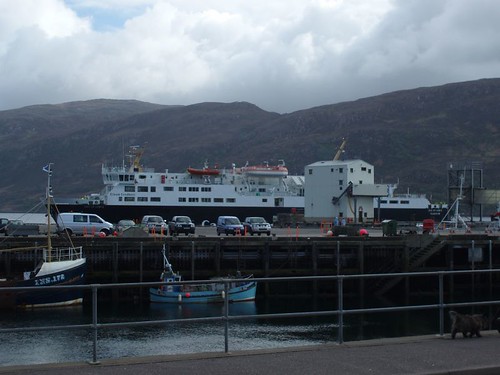
In Stornoway, meanwhile, the Muirneag was once more stuck in port following bad weather in the Minch overnight.
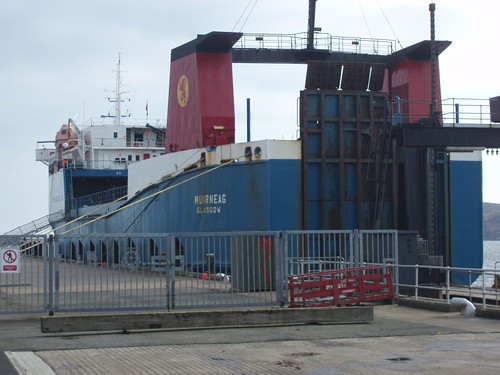
The Muirneag is known in these parts as the Olympic Flame, as it 'never goes out'. Bearing that in mind, I wonder how they are going to hawk that boat around the streets of Stornoway on June 11th as part of the torch relay for the London Olympics.
The Isle of Lewis is stuck in Ullapool following a breakdown after this morning's crossing. So, that's a pretty sight for that village.

In Stornoway, meanwhile, the Muirneag was once more stuck in port following bad weather in the Minch overnight.

The Muirneag is known in these parts as the Olympic Flame, as it 'never goes out'. Bearing that in mind, I wonder how they are going to hawk that boat around the streets of Stornoway on June 11th as part of the torch relay for the London Olympics.
Tuesday, 20 March 2012
Tuesday 20 March
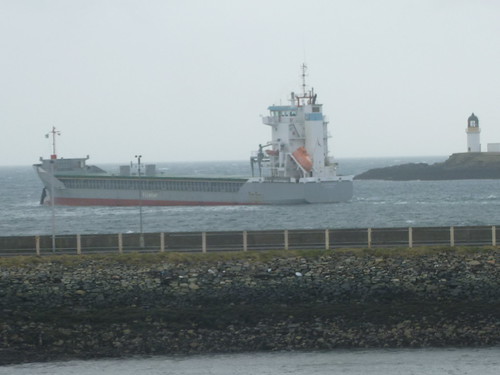
This ship is the Dutch-registered MV Flinterspirit, which put in an unscheduled appearance at Stornoway today. The vessel had been en-route to Belfast when she decided to dispute passage with the island of North Uist, 70 miles southwest of Stornoway. The island won, and the boat was stuck fast on rocks at 10.45pm last night. Fortunately, the tide was rising and the boat was able to refloat herself in the early hours of today. She was ordered north to Stornoway to check her hull for cracks. As I type this, she is anchored a few miles southeast of the town, within sight of my position.
The stranding has provoked a furious row, as the provision of an emergency tug in the Minch had been terminated as of last Saturday - without so much as a word to the Western Isles Council. The emergency tug Anglian Sovereign, based at Kirkwall in Orkney (200 miles to the eastnortheast), came across, but her services were fortunately not required, as no damage or injuries were reported. The UK government has decided that the maritime industry should provide its own tugs. I suppose that the next proposal is for the burghers of Stornoway to band together to buy and run their own ambulances, and in the meantime, an emergency ambulance would be available from Kirkwall.
Today was a windy day, with the force 7 wind prompting the cancellation of the overnight freight ferry to Ullapool.
Monday, 19 March 2012
Monday 19 March
After yesterday's sunshine, we are now back to dreich. Grey, overcast, at times wet, windy and feeling very cold in said wind. It's March, what do we expect.
I continued the transcription of the Napier Report, with the large chunk of evidence (400 pages) from Lanark and Edinburgh left to do. One of the most cruel things I came across was the episode of the bull. A factor (manager) had purchased a bull for use on his estate on the island of Mull. When the beast arrived, it soon became clear that it was infected with foot and mouth disease. So, rather than slaughtering it, the animal was shunted off to the neighbouring island of Iona, where a lot of livestock unsurprisingly died.
I'm closing this post with an image of a starling on the birdfeeder. It is in spring plumage, ready for the mating season. More blooming starlings...

I continued the transcription of the Napier Report, with the large chunk of evidence (400 pages) from Lanark and Edinburgh left to do. One of the most cruel things I came across was the episode of the bull. A factor (manager) had purchased a bull for use on his estate on the island of Mull. When the beast arrived, it soon became clear that it was infected with foot and mouth disease. So, rather than slaughtering it, the animal was shunted off to the neighbouring island of Iona, where a lot of livestock unsurprisingly died.
I'm closing this post with an image of a starling on the birdfeeder. It is in spring plumage, ready for the mating season. More blooming starlings...

Sunday, 18 March 2012
Sunday 18 March
Happy Mothering Sunday to all in the UK. Mother's Day in the US will be on the second Sunday in May.
It was a bright and sunny day here in Stornoway, but with a regular if infrequent litany of short showers. Not warm by any standard, only 7C / 45F. Spent the afternoon transcribing two sections of the Napier Report, namely Lochaline and Lismore. Apart from Boxing Day evidence from Tarbert (Argyll), I have now finished all the Highlands and Islands evidence. What remains is a large amount of blether from the hearings at Edinburgh and Lanark. Last week, I did the sections related to Islay for a local historian in that island, and can be read here
It is rare for me to comment on football, but two things have happened this weekend that made me break my rule.
I was sad to hear of the footballer who collapsed during a match. Premier League footballer Fabrice Muamba, who plays for Bolton Wanderers, apparently suffered a cardiac arrest and required at least 6 minutes of CPR on the pitch before his heart started working again. The match, a cup-tie with Tottenham Hotspur, was abandoned.
And just as I am about to close this post, news comes through that the father of a player of Kilmarnock FC (Liam Kelly), whose team beat Celtic in a cup-final here in Scotland 0-1 this afternoon, has died after suffering a heart attack at the game.
It was a bright and sunny day here in Stornoway, but with a regular if infrequent litany of short showers. Not warm by any standard, only 7C / 45F. Spent the afternoon transcribing two sections of the Napier Report, namely Lochaline and Lismore. Apart from Boxing Day evidence from Tarbert (Argyll), I have now finished all the Highlands and Islands evidence. What remains is a large amount of blether from the hearings at Edinburgh and Lanark. Last week, I did the sections related to Islay for a local historian in that island, and can be read here
It is rare for me to comment on football, but two things have happened this weekend that made me break my rule.
I was sad to hear of the footballer who collapsed during a match. Premier League footballer Fabrice Muamba, who plays for Bolton Wanderers, apparently suffered a cardiac arrest and required at least 6 minutes of CPR on the pitch before his heart started working again. The match, a cup-tie with Tottenham Hotspur, was abandoned.
And just as I am about to close this post, news comes through that the father of a player of Kilmarnock FC (Liam Kelly), whose team beat Celtic in a cup-final here in Scotland 0-1 this afternoon, has died after suffering a heart attack at the game.
Saturday, 17 March 2012
Saturday 17 March
Happy St Patrick's Day to all. It has been a sunny day in the Western Isles, with only one shower to speak off. Across the water, the freight ship Scots Isles is loading up more items for the renewable energy industry that have been produced at the fabrication yard at Arnish. Earlier this week, a plan for wave energy was put on display here in the town, as wave energy is being thought of as the way forward in this part of the world. At least you won't see much of it when it's in operation, in contrast to wind turbines.
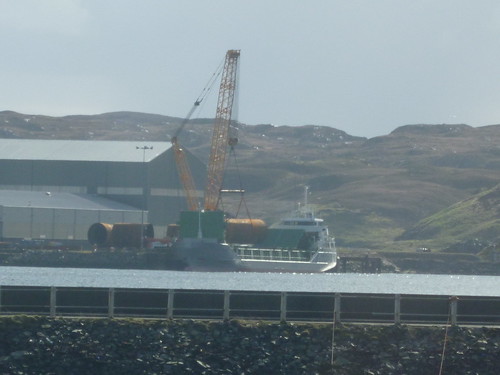
Australia has taken a hit from tropical cyclone Lua, which came ashore at the Pardoo Roadhouse northeast of Port Hedland. Winds were at 95 knots at the time of landfall, but as the cyclone moved inland it is quickly weakening. The storm will blow itself out over the Gibson Desert, but not before having dumped vast amounts of rain there.
As their cyclone season moves towards a close, our spring is just around the corner.
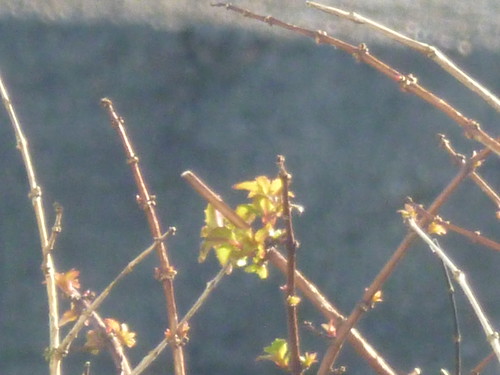

Australia has taken a hit from tropical cyclone Lua, which came ashore at the Pardoo Roadhouse northeast of Port Hedland. Winds were at 95 knots at the time of landfall, but as the cyclone moved inland it is quickly weakening. The storm will blow itself out over the Gibson Desert, but not before having dumped vast amounts of rain there.
As their cyclone season moves towards a close, our spring is just around the corner.

Friday, 16 March 2012
Friday 16 March

Image courtesy MSNBC
Today, my focus was firmly directed southeast, towards Belgium. At 11 am local time, the 22 children and 6 adults, killed in Tuesday's bus crash in Switzerland, were remembered in a nationwide one-minute silence.I found it incredibly moving to see the white coffins lined up in an airport hanger at Melsbroek airforce base near Brussels - realising that its occupants had set forth for a skiing holiday less than a fortnight previous. All programs on Belgian radio and television, in all languages, was altered to suit the mood of national mourning. It is rare for Belgians to feel Belgian, rather than Flemish or Walloon. But today was one such day.
Here in Stornoway, we are back to sunshine and showers. We were deprived of the northern lights last night; I went to Mossend to have a look, but was instead treated to a hailshower on the way back. Eoropie Tearoom did get a display.
Thursday, 15 March 2012
Thursday 15 March
The weather has not changed very much this week, with mostly grey skies, some drizzle and temperatures just below 10C. Winds are fairly brisk. I am hoping for clear-ish skies tonight, as there is a fair chance of the aurora putting in an appearance at my latitude, 58 north.
On the other side of the world, Australia is bracing itself for tropical cyclone Lua. The storm, which will blow up to a category II (95 knots) hurricane, is expected to impact the Pilbara coast near Port Hedland in Western Australia on Saturday.
The parents of the children, killed in the Swiss bus crash have been shown the personal possessions and a picture of the dead body. If desired, they could also view the corpse itself. I cannot begin to imagine what they must be going through. Six of the dead were Dutch, one was German. Belgium will observe a minute's silence at 11 am local time tomorrow morning.
On the other side of the world, Australia is bracing itself for tropical cyclone Lua. The storm, which will blow up to a category II (95 knots) hurricane, is expected to impact the Pilbara coast near Port Hedland in Western Australia on Saturday.
The parents of the children, killed in the Swiss bus crash have been shown the personal possessions and a picture of the dead body. If desired, they could also view the corpse itself. I cannot begin to imagine what they must be going through. Six of the dead were Dutch, one was German. Belgium will observe a minute's silence at 11 am local time tomorrow morning.
Wednesday, 14 March 2012
Coach crash
A tourbus, carrying Belgian school children, has crashed into a tunnel wall at Sierre in the Valais canton of Switzerland. Twenty eight people have died, of whom 22 were children aged around 12. Another 24 are injured. The crash happened at 9.15pm last night, but the recovery of the victims and wreckage has taken all night. The communities of Heverlee and Lommel in northeastern Belgium are in shock, as the fate of some of the children is not yet known. The group had been on a skiing holiday at Val d'Anniviers just outside Sierre, and was on its way home.The coach crashed into a tunnel wall recess, and no other vehicles were involved.
My sympathies go out to the family and friends of those who were lost in this tragic accident.
My sympathies go out to the family and friends of those who were lost in this tragic accident.
Tuesday, 13 March 2012
Tuesday 13 March
One of those grey, non-descript days. Not too cold, bit of a breeze.
The big news locally is the row about luggage going on board our ferry, the MV Isle of Lewis. Until recently, you could leave it in the hands of bus company Citylink, who would take it off you at Stornoway and you'd be reunited with your bags in Inverness. They stopped doing it, so you have to lug your luggage on and off the ship yourself. If you have too many bags to take up in one go, you're stuffed: the company apparently does not allow you back to collect the remainder of your luggage.So I suggested this system of luggage trolleys that are used by a Dutch ferry company. They manage to disembark all their passengers within about 10-15 minutes.
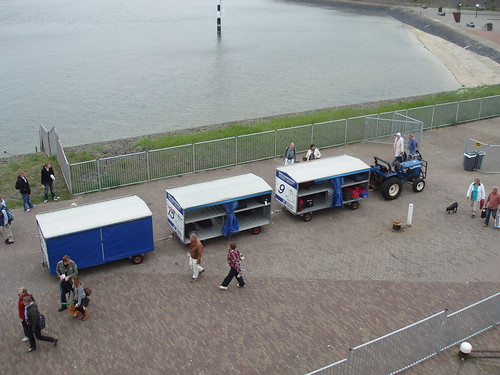
It is fairly quiet on the hurricane front, but I am keeping an eye on a forming tropical cyclone near Darwin, Australia, and a strengthening one off Port Hedland, Western Australia. Neither are expected to pose serious problems, although heavy rainfall could still be an issue.
The big news locally is the row about luggage going on board our ferry, the MV Isle of Lewis. Until recently, you could leave it in the hands of bus company Citylink, who would take it off you at Stornoway and you'd be reunited with your bags in Inverness. They stopped doing it, so you have to lug your luggage on and off the ship yourself. If you have too many bags to take up in one go, you're stuffed: the company apparently does not allow you back to collect the remainder of your luggage.So I suggested this system of luggage trolleys that are used by a Dutch ferry company. They manage to disembark all their passengers within about 10-15 minutes.

It is fairly quiet on the hurricane front, but I am keeping an eye on a forming tropical cyclone near Darwin, Australia, and a strengthening one off Port Hedland, Western Australia. Neither are expected to pose serious problems, although heavy rainfall could still be an issue.
Monday, 12 March 2012
Euthanasia
As I type this, the BBC news is running its lead news item on the plight of a man, suffering from "locked-in syndrome", who wants his doctor to kill him. The man is mentally alert, but paralysed from the neck down and unable to communicate other than through a computer that reacts to the blinking of his eye, or through a perspex board, mounted with large letters. The courts have now decided that the man can challenge the application of the law on murder in a case like this, as the pre-meditated ending of life is murder.
A discussion has been raging in the UK for some time on assisted suicide, where people are helped to end their own lives. So far, that has also been illegal. The case that today's furore is all about is different, as the sufferer is unable to take any medication independently.
This discussion has also been held in Holland, and over the last decades of the 20th century, euthanasia was permitted. It is still not legal to end someone's life, but the public prosecutor will decide not to prosecute, provided the certain conditions have been met in carrying out the euthanasia: I quote the criteria, in translation.
Please note that the link will show a Google Translation, which I have cleaned up below.
Euthanasia criteria, Netherlands
The GP must be certain that the request for euthanasia from the patient is voluntary and informed.
Explanation: The request for euthanasia should not be made under pressure or under the influence of others, or because of a mental disorder. The patient has complete insight into his illness, the likely course and its treatment options. He has also repeatedly expressed a desire to die.
The GP must be certain that there is hopeless and unbearable suffering of the patient. The patient is informed about his situation and the prognosis, and the patient is convinced that there is no reasonable alternative.
At least one other physician consult, who sees the patient and will report on whether in his opinion due diligence was exercised in performing the euthanasia or medically assisted suicide.
Notes: The doctor should perform the act himself. He must not leave it to others. In the case of assisted suicide, the physician will be present at the patient's side until death has occurred.
Euthanasia doctor may deny the request
A physician has two obligations to his patient. The first is to alleviate or eliminatethe suffering of the patient. The second is to save the life of the patient. The second obligation is diametrically oppoed to a request from a patient to die with help from the doctor. Doctors therefore refuse a request for euthanasia. Also, nurses may refuse to cooperate in the preparation of euthanasia.
A doctor or nurse may never be prosecuted for such a refusal to cooperate. The law ensures that a doctor or nurse is not in conflict with his own conscience. The doctor who himself rejects euthanasia, must refer the patient to a colleague who may be prepared to honour the request for euthanasia.
The procedure
After the death of the patient, the doctor carried out the euthanasia will write a report on the events. The non-natural death should be reported directly to the municipal coroner. The pathologist examines the body of the deceased, examines how and by what means the euthanasia was carried out and explains the findings in a separate report.
Both reports with the required attachments (eg, if present, the written directives of the patient) was sent to the regional assessment in the area where euthanasia has occurred and the local prosecutor receives the findings of the municipal coroner, because he has to give permission for the body to be released for burial.
Regional review committees
There are five regional review committees in the Netherlands: Groningen, Arnhem, Haarlem, Delft and Den Bosch. The regional review committees consist of an odd number of members, including in each case, a lawyer, a doctor and an ethicist, and they view each case whether the due diligence by the doctor who carried out the euthanasie has been observed. If this is the case, no action will be taken against him. If the opinion is that the doctor has acted contrary to the requirements or that there is doubt, then the Public Prosecutor and the regional health care inspector will be informed. When there is a criminal offense, a prosecution may follow. The inspector assesses whether disciplinary action should be taken against the physician.
What is not euthanasia:
Discontinuation or non-imposition of medical treatment at the request of the patient.
The waiver of a futile medical treatment by the doctor (this is part of normal medical practice).
Easing the pain with progressively heavier drugs (like morphine) and the stopping of artificial fluids and nutrition as a side effect that they shorten life (called palliative sedation).
The termination of life of non-viable or severely handicapped newborns and coma patients are not covered euthanasia and not by the regional review committees evaluated, or by the Public Prosecutor.
Dementia is not as unbearable and hopeless suffering, provided the person has made a euthanasia declaration before the disease has struck.
A discussion has been raging in the UK for some time on assisted suicide, where people are helped to end their own lives. So far, that has also been illegal. The case that today's furore is all about is different, as the sufferer is unable to take any medication independently.
This discussion has also been held in Holland, and over the last decades of the 20th century, euthanasia was permitted. It is still not legal to end someone's life, but the public prosecutor will decide not to prosecute, provided the certain conditions have been met in carrying out the euthanasia: I quote the criteria, in translation.
Please note that the link will show a Google Translation, which I have cleaned up below.
Euthanasia criteria, Netherlands
The GP must be certain that the request for euthanasia from the patient is voluntary and informed.
Explanation: The request for euthanasia should not be made under pressure or under the influence of others, or because of a mental disorder. The patient has complete insight into his illness, the likely course and its treatment options. He has also repeatedly expressed a desire to die.
The GP must be certain that there is hopeless and unbearable suffering of the patient. The patient is informed about his situation and the prognosis, and the patient is convinced that there is no reasonable alternative.
At least one other physician consult, who sees the patient and will report on whether in his opinion due diligence was exercised in performing the euthanasia or medically assisted suicide.
Notes: The doctor should perform the act himself. He must not leave it to others. In the case of assisted suicide, the physician will be present at the patient's side until death has occurred.
Euthanasia doctor may deny the request
A physician has two obligations to his patient. The first is to alleviate or eliminatethe suffering of the patient. The second is to save the life of the patient. The second obligation is diametrically oppoed to a request from a patient to die with help from the doctor. Doctors therefore refuse a request for euthanasia. Also, nurses may refuse to cooperate in the preparation of euthanasia.
A doctor or nurse may never be prosecuted for such a refusal to cooperate. The law ensures that a doctor or nurse is not in conflict with his own conscience. The doctor who himself rejects euthanasia, must refer the patient to a colleague who may be prepared to honour the request for euthanasia.
The procedure
After the death of the patient, the doctor carried out the euthanasia will write a report on the events. The non-natural death should be reported directly to the municipal coroner. The pathologist examines the body of the deceased, examines how and by what means the euthanasia was carried out and explains the findings in a separate report.
Both reports with the required attachments (eg, if present, the written directives of the patient) was sent to the regional assessment in the area where euthanasia has occurred and the local prosecutor receives the findings of the municipal coroner, because he has to give permission for the body to be released for burial.
Regional review committees
There are five regional review committees in the Netherlands: Groningen, Arnhem, Haarlem, Delft and Den Bosch. The regional review committees consist of an odd number of members, including in each case, a lawyer, a doctor and an ethicist, and they view each case whether the due diligence by the doctor who carried out the euthanasie has been observed. If this is the case, no action will be taken against him. If the opinion is that the doctor has acted contrary to the requirements or that there is doubt, then the Public Prosecutor and the regional health care inspector will be informed. When there is a criminal offense, a prosecution may follow. The inspector assesses whether disciplinary action should be taken against the physician.
What is not euthanasia:
Discontinuation or non-imposition of medical treatment at the request of the patient.
The waiver of a futile medical treatment by the doctor (this is part of normal medical practice).
Easing the pain with progressively heavier drugs (like morphine) and the stopping of artificial fluids and nutrition as a side effect that they shorten life (called palliative sedation).
The termination of life of non-viable or severely handicapped newborns and coma patients are not covered euthanasia and not by the regional review committees evaluated, or by the Public Prosecutor.
Dementia is not as unbearable and hopeless suffering, provided the person has made a euthanasia declaration before the disease has struck.
Sunday, 11 March 2012
Sunday 11 March
Commemorating the first anniversary of the Japanese tsunami put me in mind of that other tsunami, seven years ago on Boxing Day 2004. It was triggered by an earthquake of similar magnitude, but had a far worse loss of life - about a quarter of a million people died on the fringes of the Indian Ocean. Another day worthy of remembrance. In exactly six months from now, we'll have the eleventh anniversary of 9/11.
Today was grey and drizzly in Stornoway, with the odd blink of sunshine behind the clouds.
I spent a large part of the afternoon transcribing more evidence from the Napier Commission of 1883 and the Dewar Commission of 1912. I have also unearthed the predecessor of Lord Napier's report, namely that by Sir John McNeill of 1851; in my possession is the successor report to Napier, taken in 1902. The transcriptions take the shape of cleaning up OCR renditions of scanned images of the original documents.
All these reports show the conditions of crofters and cottars (landless people) in the Highlands and Islands, which (particularly following the potato famine of 1846) was particularly dire in 1851. However, things were still so bad in the 1880s that it something not far off an uprising in the west of Scotland, leading to the setting up of the Napier Commission. Sir John A. Dewar headed up a commission to look into the provision of medical services across the Highlands and Islands, which (in 1912) was poor in this part of the world.
You'll be hearing more about this from me in the days and weeks to come.
Today was grey and drizzly in Stornoway, with the odd blink of sunshine behind the clouds.
I spent a large part of the afternoon transcribing more evidence from the Napier Commission of 1883 and the Dewar Commission of 1912. I have also unearthed the predecessor of Lord Napier's report, namely that by Sir John McNeill of 1851; in my possession is the successor report to Napier, taken in 1902. The transcriptions take the shape of cleaning up OCR renditions of scanned images of the original documents.
All these reports show the conditions of crofters and cottars (landless people) in the Highlands and Islands, which (particularly following the potato famine of 1846) was particularly dire in 1851. However, things were still so bad in the 1880s that it something not far off an uprising in the west of Scotland, leading to the setting up of the Napier Commission. Sir John A. Dewar headed up a commission to look into the provision of medical services across the Highlands and Islands, which (in 1912) was poor in this part of the world.
You'll be hearing more about this from me in the days and weeks to come.
A year ago today
Friday morning, 11 March 2011. Switched on TV to be greeted by scenes of horror from Japan. An earthquake, measuring 9 on the Richter scale, has hit Japan. Half an hour later, a tsunami of up to 40 feet in height has swept onto the country's eastern coastline, causing unbelieveable scenes of devastation. Villages, towns and cities swept away in an instant.
To date, 20,000 people are known to be dead or are still missing.
What followed was even worse. The tsunami knocked out the cooling system of the nuclear plant at Fukushima, leading to a meltdown in three of its reactors. This caused two large explosions, which spread radio-activitiy over a large area. The radio activity will take decades to decay, leaving the area around Fukushima unfit for habitation for generations.
A natural disaster, compounded by a man-made disaster.
To date, 20,000 people are known to be dead or are still missing.
What followed was even worse. The tsunami knocked out the cooling system of the nuclear plant at Fukushima, leading to a meltdown in three of its reactors. This caused two large explosions, which spread radio-activitiy over a large area. The radio activity will take decades to decay, leaving the area around Fukushima unfit for habitation for generations.
A natural disaster, compounded by a man-made disaster.
Saturday, 10 March 2012
Saturday 10 March
Overcast and grey, but mainly dry. Went over to Sandwick Cemetery in the afternoon to retake some pictures of two gravestones, primarily to get more information about the loved ones that were named on them. One was a private stone; the other related to the sinking of the Norge on 28 June 1904. In that incident, about 700 people were drowned after the ship tore out its keel on Rockall. Nine died after coming ashore in Stornoway, and lie buried at Sandwick.
The night has cleared up, and the forecast for the aurora borealis appears to be favourable. The moon is past full, so I'll be checking the northern sky regularly.
I have been transcribing more evidence from the Napier Report, some of it harrowing. A family in Tiree was being turfed out of their house, in spite of the fact that the mother was in confinement. So she had to give birth in a cart. It was not so much the landowner himself, the Duke of Argyll, but his agents who behaved like complete monsters. Next port of call will be Bunessan, Isle of Mull.
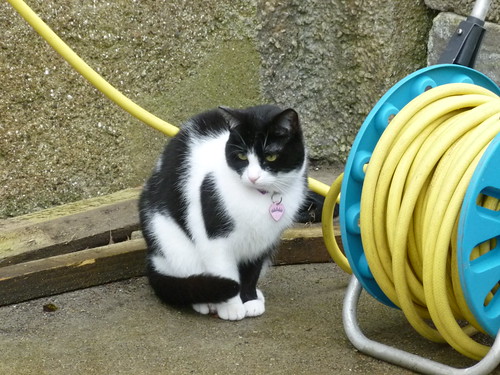
Hello puss
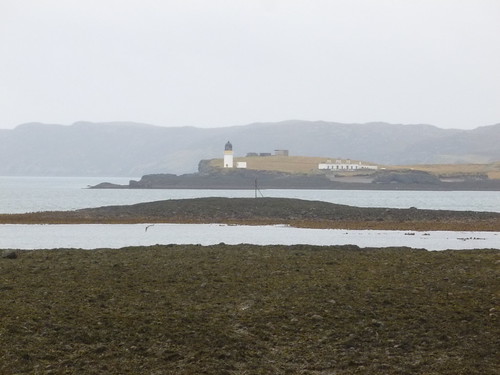
Arnish Lighthouse behind the Sgeir Mhor [Skerryvore]
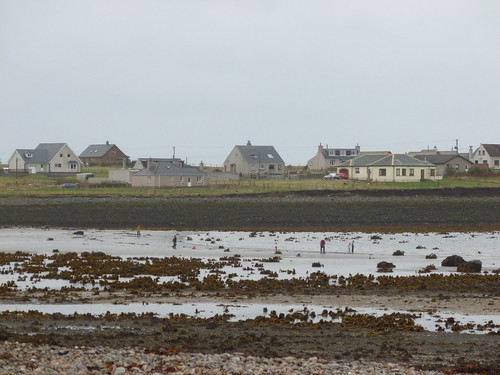
Lower Sandwick and low tide in Sandwick Bay
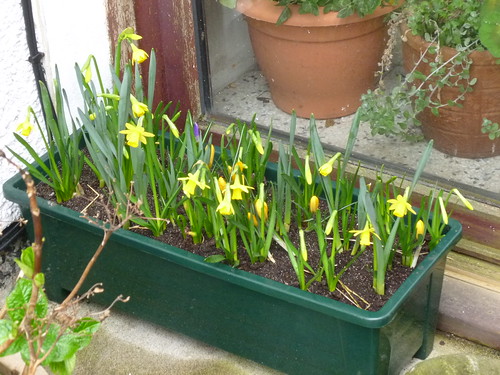
Daffs are out!
The night has cleared up, and the forecast for the aurora borealis appears to be favourable. The moon is past full, so I'll be checking the northern sky regularly.
I have been transcribing more evidence from the Napier Report, some of it harrowing. A family in Tiree was being turfed out of their house, in spite of the fact that the mother was in confinement. So she had to give birth in a cart. It was not so much the landowner himself, the Duke of Argyll, but his agents who behaved like complete monsters. Next port of call will be Bunessan, Isle of Mull.

Hello puss

Arnish Lighthouse behind the Sgeir Mhor [Skerryvore]

Lower Sandwick and low tide in Sandwick Bay

Daffs are out!
Subscribe to:
Posts (Atom)